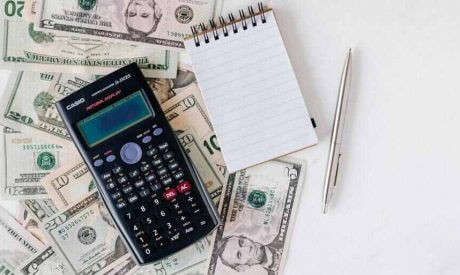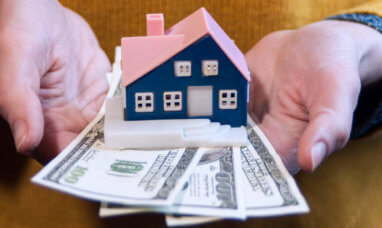It’s estimated that roughly 90% of new homes are purchased through finance options—in other words, a mortgage. That means you’re going to need a loan.
Lenders typically want somebody with a strong credit history and a good income-to-debt ratio.
They also want a down payment for you to get the keys in your hands and your foot in the door. Ideally, you’d like the lowest down payment possible. Let’s take a look at what a down payment is and some of the options available to prospective homebuyers.
What’s a Down Payment?
A down payment is money that you pay upfront for a purchase. Typically, these are for larger transactions, like buying a home or a car, where the average person doesn’t have that much cash on hand.
Normally, the amount is determined by a percentage of the overall price. For example, a 15% down payment on a 600k house would require $90,000.
That money is applied to the total purchase price and represents your stake in the property. From there, a lender will foot the rest of the cost, and you will have to pay it back with interest over a certain amount of years.
What’s the Lowest Possible Down Payment You Can Make?
First, let’s get the 20% down myth out of the way. It used to be required, but now, it’s more of a recommendation as it does have its benefits, which we’ll discuss below.
In today’s economy, it’s difficult to come up with enough cash to reach that 20% down payment threshold. However, there are some options to get a new home without going bankrupt in the process.
The true lowest down payment depends on a variety of factors. For one, the lender you choose. Some of them require down payments that can be as low as 1%. And some loans, typically those funded by the government, don’t require any down payment at all.
And there are also other variables– such as your credit score– that will determine your percentage. However, paying the lowest down payment amount has its drawbacks. These drawbacks include higher interest rates and monthly payments.
Types of Loans Available for a Mortgage
In November 2020, the National Association of Realtors put the median US home price at little over $300,000. The prices keep getting higher, and that’s why most new homes are financed.
If you’re looking to get a new home and find the lowest down payment possible, there are many lenders available to help. Let’s go over a few.
Conventional/Regular Loans
-
-
-
-
- Fannie Mae and Freddie Mac’s programs: Borrowers with a strong credit history whose lowest down payment is 3%. However, this government-sponsored program will not help anyone with a credit score below 660.
- Individual lenders: Some private lenders, like Wells Fargo, offer the Fannie Mae and Freddie Mac program, but also have their own options that can bring the lowest down payment to nearly 1%. These too require a strong credit score.
- Jumbo Loans: For borrowers deemed too risky for the other two, some lenders offer jumbo loans. However, the down payment for these types of loans ranges from 10% to 20%.
-
-
-
Government Loans
-
-
-
-
- FHA Loans: These loans come from the Federal Housing Administration and offer down payments as low as 3.5% with a 560 credit score. They also work with borrowers who have a spotty past or non-traditional credit history.
- VA Loans: Veteran Affairs provides loans with 0% down to all active and veteran military personnel and their families. There are also no broker fees or MIP, but there is a funding fee assessed.
- USDA Loans: The U.S. Department of Agriculture provides loans to assist homebuyers low-income, rural areas of the country. They require 0% down as long as the property meets USDA eligibility requirements.
-
-
-
This list is not exhaustive and there are many other options as well.
Down Payment Assistance
There are programs set up to help break some of the financial barriers that keep people from owning homes. The CDBG down payment assistance program provides grants to help homebuyers cover the initial cost.
There’s also the FHA $100 down payment program. As the name implies, you only need $100 to get a mortgage on a new home. However, these are exclusive to HUD homes.
The Benefits of a 20% (and Higher) Down Payment
If you can afford it, putting down a larger amount of cash upfront has its perks. First, you will get a lower interest rate over the life of the loan. You will also get lower monthly payments and own more of the home from the get-go.
It can also give you a leg up over the competition. A larger down payment means you will get approved for your loan faster and shows the seller you’re more serious.
How Much Should I Spend as a Down Payment?
The answer varies from person to person, property to property. It depends on your financial and personal situation. Spending a lot of money upfront will save you more in the long term.
However, it’s a huge commitment, and spending so much could leave the coffers a little low in case of an emergency. Make sure you shop around and get the best rates.
The most important part is saving as much as you can. Let’s take a look at a few tricks in the next section.
How to Save Money for a Down Payment
Any goal needs a plan of attack for success. Use these tips to help get you started in the right direction:
-
-
-
- Start today: The first step is beginning to save now. Every penny helps, and there are ways to do it automatically. Set up an auto-transfer in your favorite banking app, and you can have a nest egg saved up fast.
- Cut back frivolous spending: You know the drill– eat at home more, budget better, and skip that coffee run every morning. The little bits add up and can get you in your new home quicker.
- Find a side hustle: We’re in a gig economy, so coming up with extra cash is easier than ever. There’s Uber and Lyft on the weekends or starting an online shop on eBay or Amazon. The more income streams you have, the faster you’ll be able to save up that down payment.
-
-
Featured Image: Twenty20








